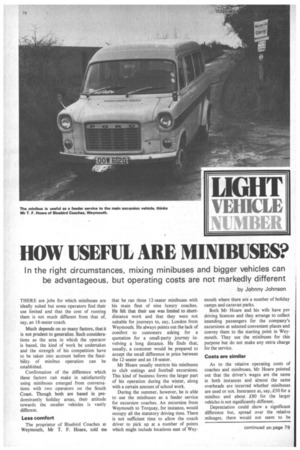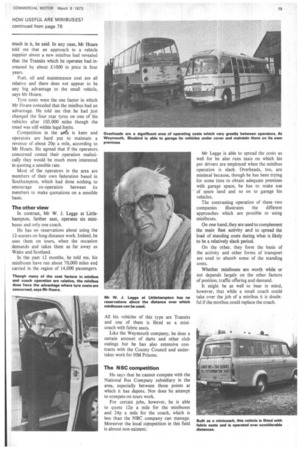HOW USEFUL ARE MINIBUSES?
Page 78

Page 81

If you've noticed an error in this article please click here to report it so we can fix it.
In the right circumstances, mixing minibuses and bigger vehicles can be advantageous, but operating costs are not markedly different
by Johnny Johnson THERE are jobs for which minibuses are ideally suited but some operators find their use limited and that the cost of running them is not much different from that of say, an 18-seater coach.
Much depends on so many factors, that it is not prudent to generalize. Such considerations as the area in which the operator is based, the kind of work he undertakes and the strength of his competition have to be taken into account before the feasibility of minibus operation can be established.
Confirmation of the difference which these factors can make in satisfactorily using minibuses emerged from conversations with two operators on the South Coast. Though both are based in predominantly holiday areas, their attitude towards the smaller vehicles is vastly different.
Less comfort The proprietor of Bluebird Coaches at Weymouth, Mr T. F. Hoare, told me that he ran three 12-seater minibuses with his main fleet of nine luxury coaches. He felt that their use was limited to shortdistance work and that they were not suitable for journeys to, say, London from Weymouth. He always points out the lack of comfort to customers asking for a quotation for a small-party journey involving a long distance. He finds that, usually, a customer would be prepared to accept the small difference in price between the 12-seater and an 18-seater.
Mr Hoare usually restricts his minibuses to club outings and football excursions. This kind of business forms the larger part of his operation during the winter, along with a certain amount of school work.
During the summer, however, he is able to use the minibuses as a feeder service for excursion coaches. An excursion from Weymouth to Torquay, for instance, would occupy all the statutory driving time. There is not sufficient time to allow the coach driver to pick up at a number of points which might include locations east of Wey
mouth where there are a number of holiday camps and caravan parks.
Both Mr Hoare and his wife have psv driving licences and they arrange to collect intending passengers for the company's excursions at selected convenient places and convey them to the starting point in Weymouth. They use the minibuses for this purpose but do not make any extra charge for the service.
Costs are similar As to the relative operating costs of coaches and minibuses, Mr Hoare pointed out that the driver's wages are the same in both instances and almost the same overheads are incurred whether minibuses are used or not. Insurance at, say,.£50 for a minibus and about £80 for the larger vehicles is not significantly different.
Depreciation could show a significant difference but, spread over the relative mileages, there would not seem to be much in it, he said. In any case, Mr Hoare told me that an approach to a vehicle supplier about a new minibus had revealed that the Transits which he operates had increased by about £1000 in price in four years.
Fuel, oil and maintenance cost are all relative and there does not appear to be any big advantage to the small vehicle, says Mr Hoare.
Tyre costs were the one factor in which Mr Hoare conceded that the minibus had an advantage. He told me that he had just changed the four rear tyres on one of his vehicles after 103,000 miles though the tread was still within legal limits.
Competition in the atei is keen and operators are hard put to maintain a revenue of about 20p a mile,, according to Mr Hoare. He agreed that if the operators. concerned costed their operation realistically they would be much more interested in quoting a sensible rate.
Most of the operators in the area are members of their own federation based in Southampton, which had done nothing to encourage co-operation between its members to make quotations on a sensible basis.
The other view In contrast, Mr W. J. Legge at Littlehatnpton, farther east, operates six minibuses and only one coach.
He has no reservations about using the 12-seaters on long-distance work. Indeed, he uses them on tours, when the occasion demands and takes them as far away as Wales and Scotland.
In the past 12 months, he told me, his minibuses have run about 70,000 miles and carried in the region of 14,000 passengers. All his vehicles of this type are Transits and one of them is fitted as a minicoach with fabric seats.
Like the Weymouth company, he does a certain amount of darts and other club outings but he has also extensive contracts with the County Council and undertakes work for HM Prisons.
The NBC competition He says that he cannot compete with the National Bus Company subsidiary in the area, especially between those points at which it has depots. Nor does he attempt to compete on tours work.
For certain jobs, however, he is able to quote 12p a mile for the minibuses and 24p a mile for the coach, which is less than the NBC company can manage. Moreover the local competition in this field is almost non-existent. Mr Legge is able to spread the costs as well for he also runs taxis on which his psv drivers are employed when the minibus operation is slack. Overheads, too, are minimal because, though he has been trying for some time to obtain adequate premises with garage space, he has to make use of spare land and so on to garage his vehicles.
The contrasting operation of these two companies illustrates the different approaches which are possible to using minibuses.
On one hand, they are used to complement the main fleet activity and to spread the load of standing costs during what is likely to be a relatively slack period.
On the other, they form the basis of the activity and other forms of transport are used to absorb some of the standing costs.
Whether minibuses are worth while or not depends largely on the other factors of position, traffic offering and demand.
It might be as well to bear in mind, however, that while a small coach could take over the job of a minibus it is doubtful if the minibus could replace the coach.




















































































































































